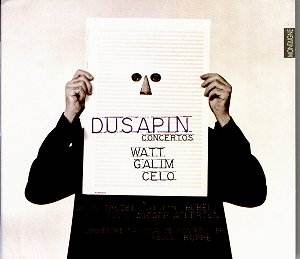Now
in his mid-forties, Pascal Dusapin is one of the most distinguished
composers of his generation. He has a quite impressive body of
works in almost every genre including several substantial string
quartets, choral and chamber music as well as operas (e.g. Medeamaterial).
He is however at his best when writing for large orchestral forces
such as in La Melancholia (on Montaigne MO 782124)
or in the three concertos recorded here. His music, while not
afraid of using some modern techniques, aims first and foremost
at direct communication and is very often of great expressive
strength. This is particularly evident in the earliest work recorded
here, the trombone concerto Watt composed in 1994
and superbly played by Alain Trudel. It opens with a sorrowful
cry, a forceful, rasping call to arms unleashing a powerful orchestral
response. This mighty score abounds in arresting textures such
as in the slow section, about halfway through the piece, when
the player sings a sad song into his instrument while holding
a B flat pedal doubled by the piccolo (a really magical moment,
this). The player also briefly switches to alto trombone. The
music progressively thins out, and the deeply moving, desolate
and affecting coda is again played by the trombone and the piccolo
in an eerie duo. The lonely, grief-laden trombone, however, has
the last word in its lowest register. This gripping score is a
magnificent achievement that undoubtedly deserves wider exposure.
Galim
(Hebrew for "wave") for flute and strings, though written
as a test piece for the finals of the 1998 Concours de flûte
"Jean-Pierre Rampal", is a beautifully moving elegy
of great restraint and understatement. It stands in total contrast
to the more dramatic trombone concerto. In his excellent and detailed
notes, Harry Halbreich rightly describes this deeply felt piece
as a modern equivalent of Gluck’s Dance of the Blessed Spirits.
A perfectly proportioned miniature of great communicative and
expressive power.
The
deliberate ambiguity of the title of Dusapin’s cello concerto
Celo (Latin for "I keep silent") is however
made clear by a quotation from Cicero prefacing the score I
wished my face to mask the pain I felt, and my silence to keep
it secret. Dusapin’s cello concerto is in three movements
of fairly equal length. In the first movement Très sombre,
pesant et profond (‘Very dark, weighty and deep’), the cello
strings must be rinsed with alcohol and played with a bow without
rosin, which results in subdued dynamics, whereas the player reverts
to a ‘normal’ bow for the second and third movements. The first
movement is a brooding prelude of some sort leading into the predominantly
slow second movement. The latter falls roughly into five lined
sections climaxing in the third section. This is followed by a
cadenza leading into the final section mirroring the mood
and music of the first section. The third movement néanmoins
assez libre (‘Nevertheless fairly free’) is more dramatic,
though allowing for a quieter episode before the abrupt, forceful
conclusion.
These
beautiful scores amply demonstrate that Dusapin is first and foremost
a lyricist and that his music strongly communicates by the sheer
force of its utter sincerity and honesty, no matter how technically
complex or demanding it may be. They are superbly well served
by all concerned and warmly, naturally recorded. In short, major
works by a most distinguished composer whose often gripping music
will never leave you unmoved or indifferent. Incidentally, do
not be put off by the rather unattractive, though apt cover, for
this is a really magnificent release that I heartily recommend.
My record of the month in any case.
Hubert
Culot
